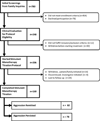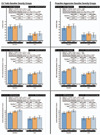Callous-unemotional traits, proactive aggression, and treatment outcomes of aggressive children with attention-deficit/hyperactivity disorder
- PMID: 24290461
- PMCID: PMC4530123
- DOI: 10.1016/j.jaac.2013.08.024
Callous-unemotional traits, proactive aggression, and treatment outcomes of aggressive children with attention-deficit/hyperactivity disorder
Abstract
Objective: Stimulant treatment improves impulse control among children with attention-deficit/hyperactivity disorder (ADHD). Decreased aggression often accompanies stimulant pharmacotherapy, suggesting that impulsiveness is integral to aggressive behavior in these children. However, children with high callous-unemotional (CU) traits and proactive aggression may benefit less from ADHD pharmacotherapy, because their aggressive behavior seems more purposeful and deliberate. This study's objective was to determine whether pretreatment CU traits and proactive aggression affect treatment outcomes among aggressive children with ADHD receiving stimulant monotherapy.
Method: We implemented a stimulant optimization protocol with 160 children 6 to 13 years of age (mean [SD] age of 9.31 [2.02] years; 78.75% male) with ADHD, oppositional defiant or conduct disorder, and significant aggressive behavior. Family-focused behavioral intervention was provided concurrently. The primary outcome was the Retrospective Modified Overt Aggression Scale. The Antisocial Process Screening Device and the Aggression Scale, also completed by parents, measured CU traits and proactive aggression, respectively. Analyses examined moderating effects of CU traits and proactive aggression on outcomes.
Results: In all, 82 children (51%) experienced remission of aggressive behavior. Neither CU traits nor proactive aggression predicted remission (CU traits: odds ratio [OR] = 0.94, 95% CI = 0.80-1.11; proactive aggression, OR = 1.05, 95% CI = 0.86-1.29). Children whose overall aggression remitted showed decreases in CU traits (effect size = -0.379, 95% CI = -0.60 to -0.16) and proactive aggression (effect size = -0.463, 95% CI = -0.69 to -0.23).
Conclusions: Findings suggest that pretreatment CU traits and proactive aggression do not forecast worse outcomes for aggressive children with ADHD receiving optimized stimulant pharmacotherapy. With such treatment, CU traits and proactive aggression may decline alongside other behavioral improvements. Clinical trial registration information--Medication Strategies for Treating Aggressive Behavior in Youth With Attention Deficit Hyperactivity Disorder; http://clinicaltrials.gov/; NCT00228046; and Effectiveness of Combined Medication Treatment for Aggression in Children With Attention Deficit With Hyperactivity Disorder (The SPICY Study); http://clinicaltrials.gov/; NCT00794625.
Keywords: CNS stimulants; aggression; attention-deficit/hyperactivity disorder (ADHD); oppositional defiant disorder; psychopathy.
Copyright © 2013 American Academy of Child and Adolescent Psychiatry. Published by Elsevier Inc. All rights reserved.
Conflict of interest statement
Disclosure: Drs. Foley, Sverd, Margulies, Matthews, and Bailey, Mr. Sauder, and Ms. Sinha report no biomedical financial interests or potential conflicts of interest.
Figures



Comment in
-
Can children with callous and unemotional traits be treated successfully?J Am Acad Child Adolesc Psychiatry. 2013 Dec;52(12):1257-9. doi: 10.1016/j.jaac.2013.09.010. J Am Acad Child Adolesc Psychiatry. 2013. PMID: 24290458 No abstract available.
References
-
- Coie JD, Lochman JE, Terry R, Hyman C. Predicting early adolescent disorder from childhood aggression and peer rejection. J Consult Clin Psychol. 1992;60(5):783–792. - PubMed
-
- Lahey BB, Loeber R, Burke JD, Applegate B. Predicting future antisocial personality disorder in males from a clinical assessment in childhood. J Consult Clin Psychol. 2005;73(3):389–399. - PubMed
-
- U.S. Public Health Service. Report of the Surgeon General’s Conference on Children’s Mental Health: A National Action Agenda. Washington, DC: U.S0 Department of Health and Human Services; 2000. - PubMed
-
- Ollendick TH, Jarrett MA, Wolff JC, Scarpa A. Reactive and proactive aggression: Cross-informant agreement and the clinical utility of different informants. J Psychopathol Behav Assess. 2009;31(1):51–59.
Publication types
MeSH terms
Substances
Associated data
Grants and funding
LinkOut - more resources
Full Text Sources
Other Literature Sources
Medical

